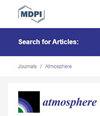南非弗雷德福特陨石坑中的氡和天然放射性核素评估
IF 2.5
4区 地球科学
Q3 ENVIRONMENTAL SCIENCES
引用次数: 0
摘要
弗赖德福特陨石坑的同心撞击环含有高浓度铀的岩石,这是陨石撞击的地质特征。据估计,这种铀的衰变会导致陨石坑室内氡浓度升高,但这种研究从未进行过。本研究探讨了在弗雷德福特火山口地质中发现的天然放射性核素与室内氡浓度之间的关系。为此,对三个撞击环进行了土壤取样和放射性核素调查,并对该地区的住宅进行了室内氡测量。现场测量显示,一个撞击环的铀浓度高于平均水平,达到 50 Bq/kg。令人惊讶的是,测量到的室内氡浓度低于预期(113 Bq/m3)。这些测量是在 COVID-19 大流行期间和寒冷的月份进行的,而在这些情况下通常会导致室内氡浓度升高。土壤样本显示铀活性为 30 Bq/kg,与 35 Bq/kg 的世界平均水平相当。然而,该地区已废弃的矿井隧道显示出较高的氡浓度,平均为 364 Bq/m3。预期室内氡浓度与测量室内氡浓度之间的差异是由于地表沉积物的成分、基岩和住宅的建筑特点阻止了氡的积累。本文章由计算机程序翻译,如有差异,请以英文原文为准。
Assessment of Radon and Naturally Occurring Radionuclides in the Vredefort Meteorite Crater in South Africa
The concentric impact rings of the Vredefort Crater contain rocks with elevated uranium concentrations resulting from the geological signature of a meteoric impact. The decay of this uranium was estimated to lead to elevated indoor radon concentrations in the Crater, but such a study has never been carried out. This study explores the relationship between the natural radionuclides i-0found in the geology of the Vredefort Crater and indoor radon concentrations. This was achieved through soil sampling and radionuclide surveys conducted on three impact rings, supplemented by indoor radon measurements in dwellings found in the area. In situ measurements revealed that one impact ring had higher-than-average uranium concentrations at 50 Bq/kg. Surprisingly, the measured indoor radon levels were lower than expected (113 Bq/m3). These measurements were taken during the COVID-19 pandemic and colder months, conditions that would typically result in elevated indoor radon levels. Soil samples indicated uranium activity of 30 Bq/kg, comparable to the world average of 35 Bq/kg. However, defunct mine tunnels in the area exhibited elevated radon concentrations, averaging 364 Bq/m3. The disparity between expected and measured indoor radon levels was attributed to the composition of surficial deposits, bedrock, and architectural features of the dwellings preventing radon accumulation.
求助全文
通过发布文献求助,成功后即可免费获取论文全文。
去求助
来源期刊

Atmosphere
METEOROLOGY & ATMOSPHERIC SCIENCES-
CiteScore
4.60
自引率
13.80%
发文量
1769
审稿时长
1 months
期刊介绍:
Atmosphere (ISSN 2073-4433) is an international and cross-disciplinary scholarly journal of scientific studies related to the atmosphere. It publishes reviews, regular research papers, communications and short notes, and there is no restriction on the length of the papers. Our aim is to encourage scientists to publish their experimental and theoretical research in as much detail as possible. Full experimental and/or methodical details must be provided for research articles.
 求助内容:
求助内容: 应助结果提醒方式:
应助结果提醒方式:


